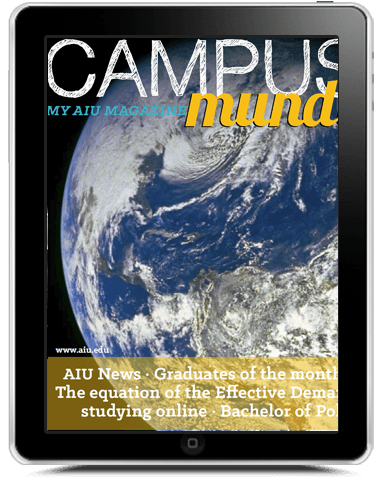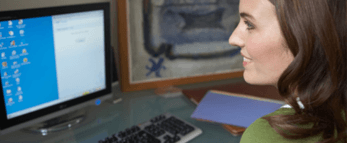While National Accreditation is common for traditional
U.S. institutions of higher learning utilizing
standard teaching methods, every country has
its own standards and accrediting organizations.
Accreditation is a voluntary process and does not
guarantee a worthy education. Rather, it means an
institution has submitted its courses, programs,
budget, and educational objectives for review. AIU’s
Distance Learning Programs are unique, non-traditional
and not accredited by the U.S. Department
of Education. This may be a determining factor for
those individuals interested in pursuing certain
disciplines requiring State licensing, (such as law,
teaching, or medicine). It is recommended that you
consider the importance of National Accreditation
for your specific field or profession.
Although Atlantic International University’s
individualized Distance Learning Degree Programs,
are distinct from traditional educational
institutions, we are convinced of their value and
acceptance worldwide. Non-traditional programs
are important because they recognize knowledge
gained outside the classroom and incorporate a
broader more comprehensive view of the learning
experience. Many great institutions are unaccredited.
We invite you to compare our programs
and philosophy with traditional classroom-based
programs to determine which is best suited to your
needs and budget.
AIU has chosen private accreditation through
the Accrediting Commission International (ACI),
obtained in 1999. ACI is not regulated or approved
by the US Department of Education. ATLANTIC INTERNATIONAL
UNIVERSITY IS NOT ACCREDITED
BY AN ACCREDITING AGENCY RECOGNIZED BY
THE UNITED STATES SECRETARY OF EDUCATION.
Note: In the U.S., many licensing authorities
require accredited degrees as the basis for eligibility
for licensing. In some cases, accredited colleges
may not accept for transfer courses and degrees
completed at unaccredited colleges, and some employers
may require an accredited degree as a basis
for eligibility for employment.
AIU is incorporated in the state of Hawaii. As a
University based in the U.S., AIU meets all state and
federal laws of
the United States. There is no distinction
between the programs offered through AIU
and those of traditional campus based programs
with regards to the following: your degree, transcript
and other graduation documents from AIU follow
the same standard used by all U.S. colleges and universities.
AIU graduation documents can include an
apostille and authentication from the U.S. Department
of State to facilitate their use internationally.
Authentication from the U.S. Department of State
is a process that will ultimately bind a letter signed
by the U.S. Secretary of State (permanently with a
metal ring) to your graduation documents.
It is acknowledged that the act of learning
is endogenous, (from within), rather
than exogenous. This fact is the underlying
rationale for “Distance Learning”, in
all of the programs offered by AIU.
The combination of the underlying
principles of student “self instruction”,
(with guidance), collaborative development
of curriculum unique to each
student, and flexibility of time and place
of study, provides the ideal learning
environment to satisfy individual needs.
AIU is an institution of experiential
learning and nontraditional education at
a distance. There are no classrooms and
attendance is not required.
MISSION: To be a higher learning
institution concerned about generating
cultural development alternatives
likely to be sustained in order to lead
to a more efficient administration of
the world village and its environment;
exerting human and community rights
through diversity with the ultimate
goal of the satisfaction and evolution
of the world.
VISION: The empowerment of the
individual towards the convergence of
the world through a sustainable educational
design based on andragogy
and omniology.
Dr. Franklin Valcin
President Academic Dean
|
|
Dr. Jose Mercado
Chief Executive Officer
|
|
Dr. Ricardo Gonzalez
Provost
|
Ricardo Gonzlez
Chief Operation Officer |
Rosie Perez
Finance Coordinator |
Monica Serrano
Registrar Office |
Jaime Rotlewicz
Dean of Admissions |
| |
|
|
|
Linda Collazo
Student Services |
Lee Robles
Student Services Supervisor |
Clara Margalef
Director of International Relations |
Kingsley Zelee
IT Coordinator |
| |
|
|
|
Laura Guillaume
Accounting Coordinator |
Ofelia Hernandez
Director of AIU |
Maria Serrano
Logistics Coordinator |
Mario Cruz
Administrative Coordinator |
| |
|
|
|
Juan Pablo Moreno
Director of Operations |
Amalia Aldrett
Admissions Coordinator |
Yolanda Llorente
Administrative Assistant |
Miqueas Virgile
IT Director |
| |
|
|
|
Alba Ochoa
Admissions Coordinator |
Nadia Bailey
Academic Tutor |
Edward Lambert
Academic Coordinator |
Sandra Garcia
Admissions Coordinator |
| |
|
|
|
Silvia Stabio
Academic Tutor |
Ariadna Romero
Academic Coordinator |
Nadia Gabaldon
Registrar Office |
Renata Da Silva
Academic Tutor |
| |
|
|
|
Carlos Aponte
Telecommunications
Coordinator |
Junko Shimizu
Academic Tutor |
|
|
The School of Business and Economics
allows aspiring and practicing
professionals, managers, and entrepreneurs
in the private and public sectors
to complete a self paced distance
learning degree program of the highest
academic standard.
The ultimate goal is to empower
learners and help them take advantage
of the enormous array of resources
from the world environment in order
to eliminate the current continuum of
poverty and limitations.
Degree programs are designed for
those students whose professional experience has been in business,
marketing, administration, economics,
finance and management.
Areas of study: Accounting, Advertising,
Banking, Business Administration,
Communications, Ecommerce, Finance,
Foreign Affairs, Home Economics,
Human Resources, International Business,
International Finance, Investing,
Globalization, Marketing, Management,
Macroeconomics, Microeconomics,
Public Administrations, Sustainable
Development, Public Relations, Telecommunications,
Tourism, Trade.

The School of Social and Human Studies
is focused on to the development of
studies which instill a core commitment
to building a society based on social and
economic justice and enhancing opportunities
for human well being.
The founding principles lie on the
basic right of education as outlined
in the Declaration of Human Rights.
We instill in our students a sense of
confidence and self reliance in their
ability to access the vast opportunities
available through information channels,
the world wide web, private, public,
nonprofit, and nongovernmental organizations in an ever expanding
global community.
Degree programs are aimed towards
those whose professional life has been
related to social and human behavior,
with the arts, or with cultural studies.
Areas of Study: Psychology, International
Affairs, Sociology, Political
Sciences, Architecture, Legal Studies,
Public Administration, Literature
and languages, Art History, Ministry,
African Studies, Middle Eastern Studies,
Asian Studies, European Studies,
Islamic Studies, Religious Studies.

The School of Science and Engineering
seeks to provide dynamic, integrated,
and challenging degree programs
designed for those whose experience
is in industrial research, scientific production,
engineering and the general
sciences. Our system for research and
education will keep us apace with the
twenty-first century reach scientific
advance in an environmentally and
ecologically responsible manner to allow
for the sustainability of the human
population. We will foster among our
students a demand for ethical behavior,
an appreciation for diversity, an understanding
of scientific investigation, knowledge of design innovation, a
critical appreciation for the importance
of technology and technological change
for the advancement of humanity.
Areas of Study: Mechanical Engineering,
Industrial Engineering, Chemical
Engineering, Civil Engineering, Electrical
Engineering, Computer Engineering,
Physics, Chemistry, Biology, Mathematics,
Communications, Petroleum
Science, Information Technology,
Telecommunications, Nutrition Science,
Agricultural Science, Computer
Science, Sports Science, Renewable
Energy, Geology, Urban Planning.

The AIU Online Library gives users instant access to more than 275 million records
in 470 languages from 112 counties. The Library Resources include 130,000 books
in e-format and over 15.9 million full text journals, articles, and periodicals. A new
record is added very 10 seconds ensuring the research material available is at the
cutting edge and keeping up our rapidly changing world.
With access to a worldwide union catalog created and maintained collectively by
more than 9,000 member institutions, students are assured an excellent research
tool for their study programs. The AIU Online Library contains 108 million quality
records, over 29,000 e-books, dozens of databases and more than 15.9 million fulltext
and full-image articles. Accessing over 60 databases and 2393 periodicals in full
text you will be sure to find the information you need for your research project or
assignment. Records exist for everything from stone tablets to electronic books, wax
recordings to MP3s, DVDs and Web sites. Users will discover that many records are
enriched with cover art, tables of contents, reviews, excerpts and other descriptive
information. Records typically have library holdings information attached. Users
can quickly evaluate relevance and decide if it’s the correct resource.








































